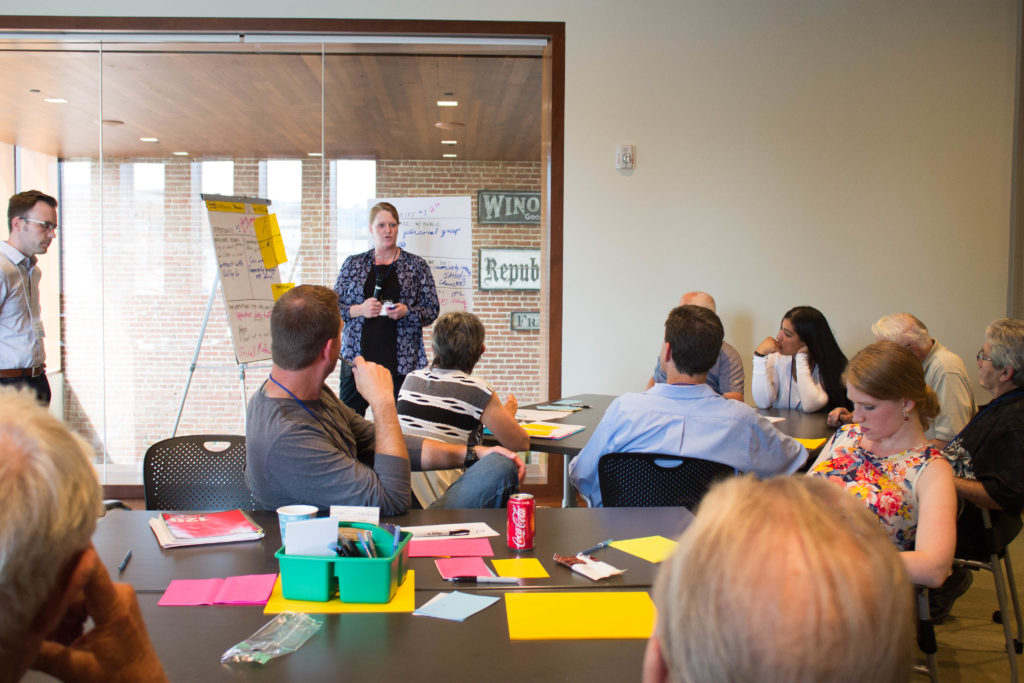In June 2018, the Winona County Energy Dialogue convened a group of 19 community members to study their energy system in detail, determine criteria to evaluate the energy system, and create action plans to help address challenges and take advantage of opportunities. 13 participants were randomly-selected to represent the demographics of the county, while 6 participants represented local officials and others involved in energy issues. At the end of the two day event, here’s a glimpse at what participants wanted their neighbors to know:
The Winona County Energy Dialogue featured a wide collection of opinions, perspectives, and great ideas from people from all walks of life and across the county. It was a productive conversation that helped bring shape to the major themes and concerns for Winona County’s present and future energy situation. We reviewed a lot of technical details and other information about our energy system in order to highlight the key information and recommendations in the report below.
We can do more to conserve energy and use energy efficiently. We can research what’s trending our way, like new technology and renewable energy. And government is not the only solution to energy issues. All of us, as citizens or the private sector, can be involved.
Below, you’ll find a summary of their discussion. To read more about the dialogue process and the community’s recommendations, download the event report.
Energy System Criteria
Participants identified four criteria of a productive energy system, and why those criteria may be important to residents of Winona County.
Reliability
Reliability is important because:
- Additional costs of weakened pipes, equipment damages, and lost time.
- Safety and health issues in emergency room nights. Fatalities. All the alarms won’t work, equipment malfunctions
- If not reliable you are going to look elsewhere.
- We count on energy, its gives us a sense of security, we feel stable and move forward
Affordability
Affordability is important because:
- Energy use is important to meet basic needs.
- Energy should be available to all regardless of income.
- Energy is important to all our lives, and requires careful use to consume responsibly.
- Consumers don’t have much control over energy costs, unlike other budget items.
- Manageable energy costs allow for families to improve their lives and invest in the economy
- Lack of affordability can limit growth. If a person or company cannot afford the energy to produce a product then work or product will not be available
Minimizing Pollution and/or Climate Change
Minimizing pollution and/or climate change is important because:
- Pollution and climate is a community issue that requires community action to solve
- Pollution and climate situation currently impacts future generations (“We’re at a tipping point”)
- There needs to be balance between current energy affordability and future negative consequences of pollution and climate extremes
- Pollution and climate have significant impact on health, economy, resources for our community
Supports Local Jobs and Local Investment
Supporting local jobs and local investment is important because:
- Teamwork cycles resources locally
- Keeps us able to support our individuals and cycle resources back in locally
- Local incomes keeps us happy
- Local incomes keeps us close and caring
- Supports our local infrastructure which has great qualities
Top Challenges
The following are the top challenges facing Winona County’s energy system, as ranked by participants.
Improving existing infrastructure
It’s a challenge to improve existing infrastructure while taking advantage of current technologies and preparing for security and distribution issues because it takes considerable time and resources, and risks and responses vary across different-sized utilities.
To address this, participants said they could continue learning about energy and technology after the event, support infrastructure funding, and get home energy audits. On a community level, they also wanted to see more town halls and discussions on the energy infrastructure, and more local organizations (like the Lions Club) get familiar with and help the community conduct energy audits.
Providing Affordable Services
Providing the necessary service at a reasonable cost makes it challenging to comply with emissions standards because sometimes regulations and demands on utilities and providers can increase costs.
To face this challenge, community members said they could participate in energy efficiency programs, subscribe to a community solar garden, support ethanol production, and attend Utility Board meetings. They wanted to see the community review energy regulations, construct Behind the Meter generation systems for solar and wind, and conduct energy research.
Educating the Public
Education, about energy topics generally and awareness of energy initiatives especially, is a challenge and needs to include the pros, cons, and implications in at least the following the areas: consumers regarding information on their bill; school-age regarding systems, creative approaches; energy efficiency programs have reached the point of diminishing returns; education and development around new building standards.
To confront these challenges, participants wanted to: learn more information from energy providers on how billing works, educate the community on ways they can save energy, pay more attention to their energy bills, implement school curriculum on how local energy works, create a local energy website hub, host community-wide energy generation discussions, establish an Energy Advocate team, and more.
Top Opportunities
Here are the top energy opportunities in Winona County, as ranked by participants.
Education and Involving the Community
Offering education and involving residents, especially children, and policymakers to make informed decisions and to change habits of energy consumption and understanding where energy is generated to realize the pros and cons of various methods is an opportunity because more people being aware of how they can support affordable, reliable energy throughout their life can have a large impact on usage and costs.
To educate the community, participants would conduct outreach to the schools and set up more direct interactions between the public and the utility companies. They wanted the community at large to talk about energy issues at local events, in order to involve community groups like the Parent-Teacher Association and churches.
Building Local Energy Infrastructure
Encouraging local options, including having conventional and renewable energy generated locally, with generation and infrastructure built and maintained by local workers, trained locally, is an opportunity because this could help support local investment and jobs by reducing overall costs for local residents and businesses.
To bring this plan to life, participants advocated for investing in local energy production (including renewables), speaking with local officials, supporting local energy infrastructure, and co-ops. As a community, they wanted to see more community college programs focused on energy, debt forgiveness for local energy workers, and navigable energy regulations, and better incentives to support local renewable industries.
Embracing New Technology
We need to develop and implement new advances in technology and the many proven services in use, including potentially bioenergy, renewable energy, or other technologies, when possible, because these will help diversify our energy options and could help make energy more affordable to produce and deliver.
In order to embrace new technology, Winona County residents wanted to measure their individual energy efficiency levels, and individually generate wind and solar at their homes. They also wanted to see group buys for community solar and solar gardens, and investment in biomass, geothermal energy, methane capture, and other energy innovations.



